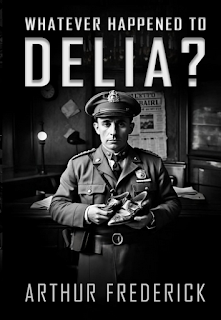By Paul Carrier
Let’s get a bit of housekeeping out of the way at the outset. Arthur Frederick, the author of Whatever Happened to Delia?, is a friend of mine, dating back to a time, many years ago now, when we both worked as journalists in Augusta, Maine. When Frederick popped a copy of this novel into the mail, I dug in.
The eponymous Delia is Delia Burke Bissett, wife of Arthur Bissett, whom she met and married in Boston after they emigrated, Delia from Ireland and Arthur from Scotland. The couple’s brood comes to include a son named Arthur, who narrates the novel as a young husband and father living in Boston in the early 20th century while working as a railroad fireman and, later, as a train engineer.
The younger Arthur was raised by adoptive parents after Delia disappeared when he was an infant. Learning of his adoption after his adoptive parents died, Arthur tracks down his biological father, a cook who tells him that Delia was a very heavy drinker by the time she went missing. Lacking the time or the money to care for the boy by himself, the elder Arthur says, he arranged for his son’s adoption.
Arthur père is pleased to be reconnected with his son, but he insists he has no idea what became of his wife. Even some 30 years after Delia vanished, her husband says he still hopes she may return some day.
A reader can easily conjure up several possible explanations for Delia’s disappearance.
Raised Catholic in Ireland, Delia was criticized and belittled by a Boston priest who rudely refused her request for a church wedding because her fiancé was a Protestant, which may have soured her outlook. In the years that followed, Delia suffered tragic losses as a young mother when three of her four sons died. Maybe, as Arthur speculates, Delia found a way back to her native Ireland. Perhaps she committed suicide in Boston, or died accidentally while wandering in a drunken stupor.
The younger Arthur reports Delia’s disappearance to the authorities, only to learn that the Boston police have no 30-year-old reports of a missing woman. The police in nearby Cambridge have discovered the decomposed body of a woman who died some three decades earlier, but they have not been able to identify her.
Frederick carefully builds a suspenseful story line as the younger Arthur searches for answers with the help of two police detectives from Boston and Cambridge, the sympathetic ear of a young priest and a tip from a conscientious housekeeper at the rectory of the Catholic church where Delia and Arthur had tried to get married.
In a fascinating afterword, Frederick says the novel’s protagonist, the younger Arthur Bissett, was inspired by Frederick’s paternal grandfather, Arthur Frederick (born Arthur W. Bissett Jr.). The author's grandfather was adopted at a young age by William and Annie Frederick, and he believed his adoptive parents were his birth parents until he learned otherwise after they died. There are other strong parallels between the novel and the historical record. In fact, the author writes that “perhaps 75 percent of the story is factual.”
Whatever the ratio of fact to fiction, this moving, ultimately tragic narrative is a compelling and memorable tale of deceit, cruelty and vengeance in which the dogged determination of one young man takes him to a very dark place indeed.


No comments:
Post a Comment